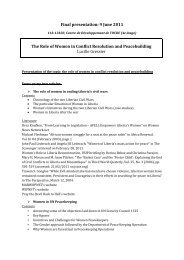Women's Economic Opportunity Index - Economist Intelligence Unit
Women's Economic Opportunity Index - Economist Intelligence Unit
Women's Economic Opportunity Index - Economist Intelligence Unit
- No tags were found...
You also want an ePaper? Increase the reach of your titles
YUMPU automatically turns print PDFs into web optimized ePapers that Google loves.
Appendix IWomen’s economic opportunityA new global index and ranking118. Promoting Gender EquitableOpportunities in Agricultural ValueChains: A Handbook, US Agency forInternational Development GreaterAccess to Trade Expansion (GATE)Project: Washington DC, 2009.119. E Katungi, S Edmeades andM Smale, “Gender, Social Capitaland Information Exchange inRural Uganda”, Collective Actionand Property Rights WorkingPaper No. 59, Consultative Groupon International AgriculturalResearch: Washington DC, October2006. http://www.capri.cgiar.org/pdf/capriwp59.pdf120. One Woman = One Business.Why Business and ManagementEducation for Women Is Essentialto <strong>Economic</strong> Development,International Centre for Researchon Women: Washington DC,September 2008.121. P Richardson, R Howarth andG Finnegan, “The Challenges ofGrowing Small Businesses: Insightsfrom Women Entrepreneurs inAfrica”, SEED Working Paper No.47, International Labour Office:Geneva, 2004.122. See P Fernando, and G Porter(eds.), Balancing the Load. Women,Gender and Transport, Zed Booksin association with InternationalForum for Rural Transport andDevelopment: London, 2002.R Law, “Beyond ‘women andtransport’: towards newgeographies of gender and dailymobility”, Progress in HumanGeography, Vol. 23, No. 4, 1999,pages 567-588.123. http://www.genderindex.org124. See R Jeffery and A M Basu(eds.), Girls’ Schooling, Women’sAutonomy and Fertility Change inSouth Asia, Sage Publications: NewDelhi, 1996.Z Mumtaz and S Salway, “‘I NeverGo Anywhere’: Extricating theLinks between Women’s Mobilityand Uptake of Reproductive HealthServices in Pakistan”, Social Science& Medicine, Vol. 60, Issue 8, 2005,pages 1751–1765.125. N Kabeer, “Women, Wages andIntra-Household Power Relations inUrban Bangladesh”, Developmentand Change, Vol. 28, No. 2, 1997,pages 261-302.126. S Amin, “The Poverty-Purdah Trap in Rural Bangladesh:Implications for Women’s Rolesin the Family”, Working Paper75, Population Council ResearchDivision: New York, 1995. Cited inS Salway, S Jesmin and S Rahman,Development and Change, Vol. 36Issue 2, 2005, pages 317-349.Women’s Freedom of MovementMobility is a significant factor in access to economic resources, education, health and other centralelements influencing women’s empowerment. Increasingly, it is recognised that a woman’s ability totravel easily is an important factor in accessing economic opportunities. Restrictions on a woman’smobility may limit travel to markets, and reduce her networking opportunities. This also affects her accessto business information and networks. It is useful to note that spaces where information is exchanged arenot necessarily gender-neutral. 118 For example, in Albania, market information is often received throughnetworking with colleagues in local coffee shops. These coffee shops are considered male spaces, andwomen do not comfortably congregate there. Similarly, in rural Uganda, men network in drinking clubs,spaces women are restricted from entering. 119The International Centre for Research on Women (ICRW) has recognised that access to non-financialservices is as important as financial services to women to access economic opportunities. 120 Such servicesinclude market information and access, management and financial training, peer networks and leadershipskills. Women entrepreneurs in developing countries have themselves identified a need for education andskills, including specialised training, financial advice, business counselling and marketing support fortheir products and services. 121 However, if women’s mobility is limited, access to such support will also bereduced.Limited mobility could stem from economic constraints. For example, women may not own or haveaccess to private means of transport, and hence are reliant on public transport or walking. 122 Mobilitycould be constrained by legal and cultural factors. The Women’s <strong>Economic</strong> <strong>Opportunity</strong> <strong>Index</strong> does notlook directly at the issues of women and transport, in part because there is little sex-disaggregated dataon the subject; the index considers infrastructure risk broadly under the “General Business Environment”category.Legal and cultural restrictions on travel that apply only to women are, however, a gender-specificconstraint that the <strong>Index</strong> attempts to address. The indicator is sourced from the OECD DevelopmentCentre, which constructed a “Women’s Freedom of Movement” indicator for its Social Institutions andGender <strong>Index</strong>. 123 The indicator is a qualitative assessment made by the OECD Development Centre, basedon country analyses done by the team.It is acknowledged that in certain contexts—notably in South Asia, and the Middle East and NorthAfrica—individual identity is subordinated to relationships and transactions with others, and a woman’swellbeing is bound to that of the larger household. 124 As one study notes, in such a context, women’slong-term interests may be better served by preserving household solidarity and co-operation rather thanmeeting one’s personal needs, and the system penalises any attempt at autonomous or individualisticforms of behaviour. 125 It is also recognised that observed mobility cannot be uncritically equated with anotion of “freedom of movement”, as it may reflect economic necessity rather than preference. 126Further ReadingL Aljounaidi, “Gender and Transport in MENA - Case Studies form West Bank, Gaza and Yemen”, MENAKnowledge and Learning, Quick Notes Series, Number 21, World Bank: Washington DC, March 2010.122 <strong>Economist</strong> <strong>Intelligence</strong> <strong>Unit</strong> 2010




